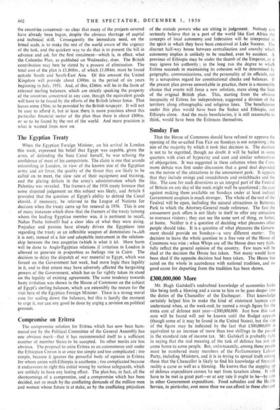The Egyptian Treaty
When the Egyptian Foreign Minister, on his arrival in London this week, expressed his belief that Egypt was capable, given the arms, of defending the Suez Canal herself, he was echoing the confidence of most of his compatriots. The claim is one that sounds astonishing in London, in view of the known size of the Egyptian army and air force, the quality of the threat they are likely to be called on to meet, the slow rate of their equipment and training, and the glaring defects in the army's administration which the Palestine war revealed. The framers of the 1936 treaty foresaw that some disputed judgement on this subject was likely, and Article 8 provided that the question of Egypt's ability to defend the Canal should, if necessary, be referred to the League of Nations for decision when the treaty came up for renewal in 1956. This is one of many instances which show that the framers of the treaty (among whom the leading Egyptian member was, it is pertinent to recall, Nahas Pasha himself) had a clear idea of what they were doing. Prejudice and passion have already driven the Egyptians into regarding the treaty as an inflexible weapon of domination (w..ich it is not), instead of a fair and adaptable instrument in the relation- ship between the two countries (which is what it is). More harm will be done to Anglo-Egyptian relations if irritation in London is allowed to generate in proportion as feelings rise in Cairo. The decision to delay the dispatch of war material to Egypt, which was forced on the Government last week, had more logic than legality in it, and to that extent may have adversely affected the bargaining powers of the Government, which has so far rightly taken its stand on the legality of existing agreements. The same tendency towards hasty irritation was shown in the House of Commons on the subject of Egypt's sterling balances, which are ostensibly the reason for the visit here of the Egyptian Foreign Minister. There is a strong moral case for scaling down the balances, but this is hardly the moment to urge it, nor can any good be done by urging a revision on political grounds.






































 Previous page
Previous page